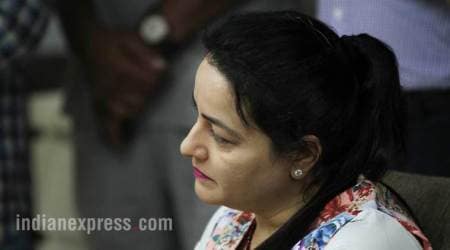 Police at Sacha Sauda camp in Salabatpura, Bathinda. Harmeet Sodhi & Gurmeet Singh
Police at Sacha Sauda camp in Salabatpura, Bathinda. Harmeet Sodhi & Gurmeet Singh
Haryana police and paramilitary forces may soon enter the Sirsa headquarters of the Dera Sacha Sauda after the Punjab and Haryana High Court on Tuesday allowed sanitisation of the Dera, accepting the state government’s request. Searches at the Dera will be conducted under the supervision of retired District and Sessions Judge Anil Kumar Singh Panwar, who has been appointed as Court Commissioner. He will submit a report to the High Court and state government in a sealed cover.
Haryana Advocate General Baldev Mahajan said the state government wants to conduct the search operation immediately. “However, the process may take one or two days as first of all the High Court order will be sent to the Court Commissioner, who will take a call to initiate the search operation,” Mahajan said.
Government sources say that only police and paramilitary forces will enter the Dera to assist officers in the search operation. The state government will provide a car, Rs 1.2 lakh and other facilities to the Court Commissioner, besides security and staff to assist him with his duties. The Dera was vacated a few days ago after violence allegedly by followers of the sect in Sirsa and Panchkula.
Anshul Chhatarpati, whose father and Sirsa-based journalist Ram Chander Chattarpati was allegedly killed by Dera followers at the behest of Gurmeet Ram Rahim in 2002, has been questioning the delay behind the police entering the Dera premises. He has alleged that “the delay may give a chance to the Dera followers to bring arms and black money out”. Anshul had also demanded that the Army be given a “free hand” for a search operation.
The state government had moved an application to the High Court on Friday , urging for directions “to appoint the illaqa magistrate or a senior judicial officer to oversee the sanitisation process in order to ensure greater transparency”.
Many believe the Manohar Lal Khattar government did not want to be seen as going against the Dera as “judicial supervision may send a message to the followers that any action… was carried out as part of a judicial process”.

